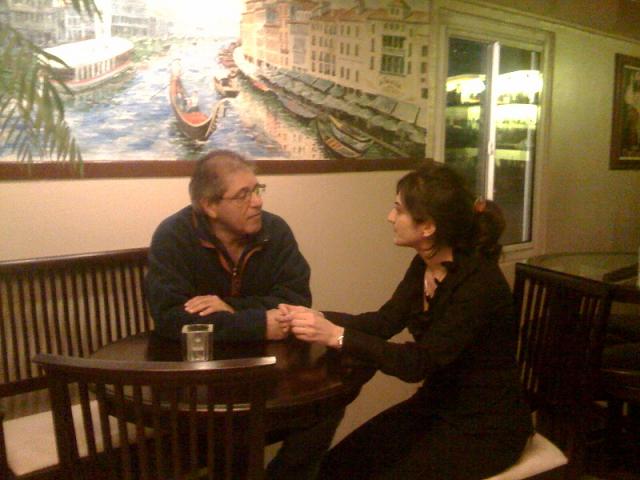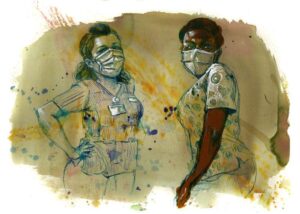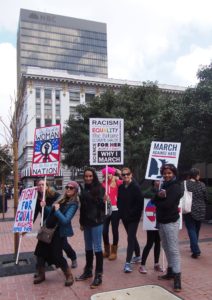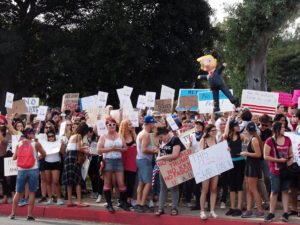“Turkey must take the first step”

My first question was: “How is Turkish-American relations lately?”
“Given the new administration, I venture to say, that they are very good and very hopeful that the strategic partnership between the United States and Turkey will continue” he said.
What is your opinion about the position that was taken by Turkish government in Middle East?
The Turkish Government is currently building important bridges to all of Turkey’s neighbors. I believe that this is a positive strategy and could enhance Turkey’s ability to resolve and manage regional conflicts because if its growing ability to reach out and talk to diverse states with conflicting interests.
Genocide bill again confronts U.S. diplomacy. But I heard that, Armenian intellectuals are preparing to launch a campaign to apologize for the killings of Turks by Armenian gangs during the final years of the Ottoman Empire and the ASALA’s actions in 1980’s.
I have not heard of that. But if it does happen, it could have a positive impact on local politics in Turkey as well as in Armenia. ASALA was not only an early 20th Century phenomenon, but one which occurred in the nineteen eighties. Any effort to bring about reconciliation between Armenia and Turkey is a step in the right direction. Whatever problems exist between Armenia and Turkey, must be solved directly by Armenia and Turkey. I see a golden opportunity today that confidence-building measures can replace years of misunderstanding between Armenia and Armenians on one hand and Turkey and Turks on the other.
As you know, a similar campaign launched by Turkish intellectuals in December 2008 for the killings of Armenians at the hands of the Ottoman Empire triggered a heated debate in Turkey and drew angry criticism from certain circles which claimed the apology campaign would deal a blow to Turkey’s efforts to normalize relations with Armenia.
In that point your words are so important for me. First of all what is your opinion about this campaigns? Do you think this campaigns will broke the ice between the two countries?
It takes more than a campaign to change old beliefs, attitudes and values. It is going to take a serious effort by governments to confront the past head on. This takes leadership and new conflict resolution institutions that are not yet in place. The campaign can plant the seeds, but the seeds need the right soil and water to grow.
Do you think “the big grey clouds” will disappear one day between two countries?
No. I believe Armenia and Turkey should strengthen their current dialogue and move to resolve at least some of the small thorny issues between them and later move to address the bigger problems. Turkey must take the first step. After all there is no substitute for Turkish leadership right now in the region.
How will the story of the bleeding end?
Positively, I hope.
In this sense, the introduction of H.R. 106 or the usage of the “G” word in an Obama statement on April 24, 2009 would immediately reflect on the Turkish-American relationship. What is your opinion?
The resolution in question will not serve anybody’s interests–Armenia, the US, and Turkey. At the end, only level-headedness will prevail. I am sure of it. All three (US, Armenia, and Turkey) need one another to address common security and economic problems. This is not the time for recrimination or isolation. Cooperation between the US, Armenia, and Turkey is critical to safeguarding the immensely valuable strategic partnership between Turkey and the United States–a partnership that has been in place since the late nineteen twenties.
They say: “There is no tolerance left on this issue in Turkey” Do you think this statement would immediately reflect on the Turkish-American relationship?
I ask the Turkish people to be patient and to remain cool-headed and calm. I hope the United States will ultimately do the right thing, but it it does not, and the resolution in question passes, Turkey and its people (civilians and military) must remain united and must develop new strategies for addressing the Armenian issue. After all, it is only one issue of many that are important to the United States and to Turkey. Neither side should allow this one issue to negatively impact on over 80 years of strategic relationship. Turkey must think of the “big picture” and of grand strategy; and there is no better time to start doing so than right now.
What impact will Prime Minister Erdoğan’s emotional outburst at Davos have on Turkish-American relations?
None! The sooner Turkey puts it behind it, the better. Friends can disagree over policies. The strategic relationship between Israel and Turkey remains strong.
“The support of the pro-Israel lobby often proved crucial in stopping Armenian-American efforts for a genocide resolution in Congress” they say. What is your opinion?
Turkey has been successful in the past because it has been able to build a winning coalition in Congress. The so-called Israeli lobby is only one piece of this coalition–granted an important one. Turkey must never rely on any one member of its winning coalition to present its case. This is why it must develop a comprehensive strategy to strengthen its enduring partnership. Nothing else will suffice. The United States needs Turkey as much as Turkey needs the United States. It is a healthy interdependent relationship.
(Turkish Journal)



